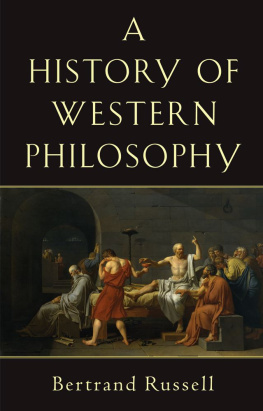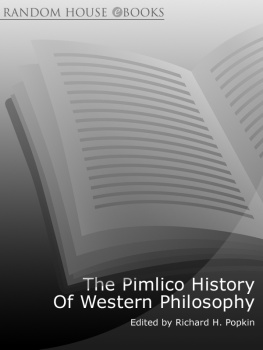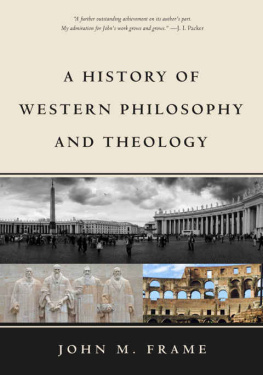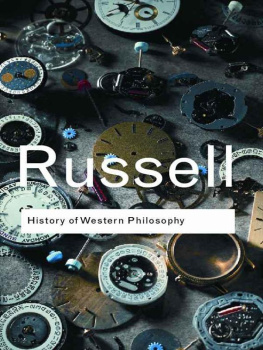Kenny - A New History of Western Philosophy: In Four Parts
Here you can read online Kenny - A New History of Western Philosophy: In Four Parts full text of the book (entire story) in english for free. Download pdf and epub, get meaning, cover and reviews about this ebook. City: Oxford, year: 2010, publisher: Oxford University Press, genre: Religion. Description of the work, (preface) as well as reviews are available. Best literature library LitArk.com created for fans of good reading and offers a wide selection of genres:
Romance novel
Science fiction
Adventure
Detective
Science
History
Home and family
Prose
Art
Politics
Computer
Non-fiction
Religion
Business
Children
Humor
Choose a favorite category and find really read worthwhile books. Enjoy immersion in the world of imagination, feel the emotions of the characters or learn something new for yourself, make an fascinating discovery.

A New History of Western Philosophy: In Four Parts: summary, description and annotation
We offer to read an annotation, description, summary or preface (depends on what the author of the book "A New History of Western Philosophy: In Four Parts" wrote himself). If you haven't found the necessary information about the book — write in the comments, we will try to find it.
Kenny: author's other books
Who wrote A New History of Western Philosophy: In Four Parts? Find out the surname, the name of the author of the book and a list of all author's works by series.
A New History of Western Philosophy: In Four Parts — read online for free the complete book (whole text) full work
Below is the text of the book, divided by pages. System saving the place of the last page read, allows you to conveniently read the book "A New History of Western Philosophy: In Four Parts" online for free, without having to search again every time where you left off. Put a bookmark, and you can go to the page where you finished reading at any time.
Font size:
Interval:
Bookmark:
A New History of Western Philosophy
In Four Parts
ANTHONY KENNY


Great Clarendon Street, Oxford 0x2 6D?
Oxford University Press is a department of the University of Oxford.
It furthers the Universitys objective of excellence in research, scholarship,
and education by publishing worldwide in
Oxford New York
Auckland Cape Town Dar es Salaam Hong Kong Karachi
Kuala Lumpur Madrid Melbourne Mexico City Nairobi
New Delhi Shanghai Taipei Toronto
With offices in
Argentina Austria Brazil Chile Czech Republic France Greece
Guatemala Hungary Italy Japan Poland Portugal Singapore
South Korea Switzerland Thailand Turkey Ukraine Vietnam
Oxford is a registered trade mark of Oxford University Press
in the UK and in certain other countries
Published in the United States
by Oxford University Press Inc., New York
Sir Anthony Kenny 2010
The moral rights of the author have been asserted
Database right Oxford University Press (maker)
First published 2007
First published in paperback 2008
This volume published 2010
All rights reserved. No part of this publication may be reproduced,
stored in a retrieval system, or transmitted, in any form or by any means,
without the prior permission in writing of Oxford University Press,
or as expressly permitted by law, or under terms agreed with the appropriate
reprographics rights organization. Enquiries concerning reproduction
outside the scope of the above should be sent to the Rights Department,
Oxford University Press, at the address above
You must not circulate this book in any other binding or cover
and you must impose the same condition on any acquirer
British Library Cataloguing in Publication Data
Data available
Library of Congress Cataloging in Publication Data
Data available
Typeset by SPI Publisher Services, Pondicherry, India
Printed in Great Britain
on acid-free paper by
Clays Ltd., St Ives plc
ISBN 978-0-19-958988-3
1 3 5 7 9 10 8 6 4 2
To the memory of Georg Henrik von Wright
Detailed contents lists are placed at the beginning of each part. There are maps before the introductions of Parts One, Two, and Three.
Why should one study the history of philosophy? There are many reasons, but they fall into two groups: philosophical and historical. We may study the great dead philosophers in order to seek illumination upon themes of our own philosophical inquiry. Or we may wish to understand the people and societies of the past, and read their philosophy to grasp the conceptual climate in which they thought and acted. We may read the philosophers of other ages to help to resolve philosophical problems of abiding concern, or to enter more fully into the intellectual world of a bygone era.
A historian of philosophy should make clear which of these two tasks he is addressing. In this introduction I shall outline the nature of my own project, but first there are many further distinctions to be made. The word philosophy means different things in different mouths. Correspondingly, the history of philosophy also has many meanings. What it means depends on what the particular historian regards as being essential to philosophy. This was true of Aristotle, who was philosophys first historian, and it was true of Hegel, who hoped he would be its last. The two of them had rather different views of the nature of philosophy.
Both of them, however, studied its history for philosophical rather than historical reasons. Moreover, they shared a particular view of philosophical progress, in which the problems that define the philosophical enterprise are seen and understood ever more clearly, and in which their answers become more and more apparent. Aristotle in the first book of his Metaphysics, and Hegel in his Lectures on the History of Philosophy saw the teachings of the earlier philosophers they recorded as halting steps in the direction of a vision they were themselves to expound.
Only someone with supreme self-confidence as a philosopher could write its history in such a way. The temptation for most philosopher historians is to see philosophy not as culminating in their own work, but rather as a gradual progress to whatever philosophical system is currently in fashion. But this temptation should be resisted. There is no force that guarantees philosophical progress in any particular direction.
Indeed, it can be called into question whether philosophy makes any progress at all. The major philosophical problems, some say, are all still being debated after centuries of discussion, and are no nearer to any definitive resolution. In the twentieth century the philosopher Ludwig Wittgenstein wrote:
You always hear people say that philosophy makes no progress and that the same philosophical problems which were already preoccupying the Greeks are still troubling us today. But people who say that do not understand the reason why it has to be so. The reason is that our language has remained the same and always introduces us to the same questions....I read philosophers are no nearer to the meaning of reality than Plato got. What an extraordinary thing! How remarkable that Plato could get so far! Or that we have not been able to get any further! Was it because Plato was so clever? (MS 213/424)
The difference between what we might call the Aristotelian and the Wittgensteinian attitude to progress in philosophy derives from two different views of philosophy itself. Philosophy may be viewed as a science, on the one hand, or as an art, on the other. Philosophy is, indeed, uniquely difficult to classify, and resembles both the arts and the sciences.
On the one hand, philosophy seems to be like a science in that the philosopher is in pursuit of truth. Discoveries, it seems, are made in philosophy, and so the philosopher like the scientist has the excitement of belonging to an ongoing, cooperative, cumulative intellectual venture. If so, the philosopher must be familiar with current writing, and keep abreast of the state of the art. On this view, we twenty-first-century philosophers have an advantage over earlier practitioners of the discipline. We stand, no doubt, on the shoulders of other and greater philosophers, but we do stand above them. We have superannuated Plato and Kant.
On the other hand, in the arts, classic works do not date. If we want to learn physics or chemistry, as opposed to their history, we do not nowadays read Newton or Faraday. But we read the literature of Homer and Shakespeare not merely to learn about the quaint things that passed through peoples minds in far-off days of long ago. Surely, it may well be argued, the same is true of philosophy. It is not merely in a spirit of antiquarian curiosity that we read Aristotle today. Philosophy is essentially the work of individual genius, and Kant does not supersede Plato any more than Shakespeare supersedes Homer.
There is truth in each of these accounts, but neither is wholly true and neither contains the whole truth. Philosophy is not a science, and there is no state of the art in philosophy. Philosophy is not a matter of expanding knowledge, of acquiring new truths about the world; the philosopher is not in possession of information that is denied to others. Philosophy is not a matter of knowledge; it is a matter of understanding, that is to say, of organizing what is known. But because philosophy is all-embracing, so universal in its field, the organization of knowledge that it demands is something so difficult that only genius can do it. For those of us who are not geniuses, the only way in which we can hope to come to grips with philosophy is by reaching up to the mind of some great philosopher of the past.
Next pageFont size:
Interval:
Bookmark:
Similar books «A New History of Western Philosophy: In Four Parts»
Look at similar books to A New History of Western Philosophy: In Four Parts. We have selected literature similar in name and meaning in the hope of providing readers with more options to find new, interesting, not yet read works.
Discussion, reviews of the book A New History of Western Philosophy: In Four Parts and just readers' own opinions. Leave your comments, write what you think about the work, its meaning or the main characters. Specify what exactly you liked and what you didn't like, and why you think so.











